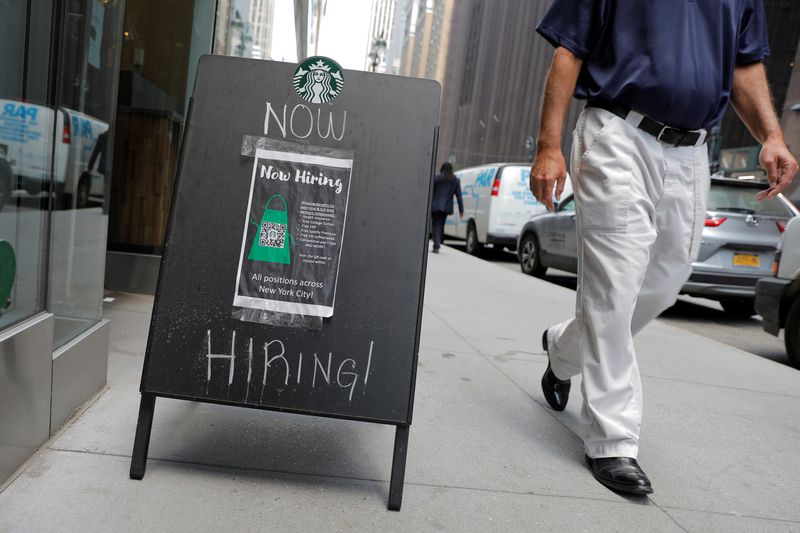By Lucia Mutikani
WASHINGTON (Reuters) - The number of Americans filing new claims for jobless benefits dropped to a two-month low last week, pointing to underlying labor market strength even as demand for workers is easing.
With the report from the Labor Department on Thursday also showing the number of people on unemployment rolls remained elevated towards the end of December, financial markets continued to anticipate that the Federal Reserve would start cutting interest rates in March.
The government reported on Wednesday that job openings fell to a near three-year low in November. Labor market resilience is expected to again shield the economy from recession this year.
"The labor market is not too hot and not too cold at the moment," said Christopher Rupkey, chief economist at FWDBONDS in New York. "The total number of Americans on the jobless rolls receiving benefits remains elevated relative to prior year levels, but at the moment there is not enough unemployment to say the economy is on the downward slope to recession."
Initial claims for state unemployment benefits dropped 18,000 to a seasonally adjusted 202,000 for the week ended Dec. 30, the lowest level since mid-October. Economists polled by Reuters had forecast 216,000 claims for the latest week.
Claims data tend to be volatile around this time of year because of holidays. They have largely bounced around in the lower end of their 194,000-265,000 range for 2023.
Unadjusted claims fell 6,820 to 268,020 last week. Claims plunged by an estimated 7,572 in California and tumbled 6,080 in Texas. That helped to more than offset notable increases in Pennsylvania, New Jersey, Michigan, Massachusetts and Connecticut.
The labor market is steadily cooling following 525 basis points worth of interest rate hikes from the Federal Reserve since March 2022. The unemployment rate, however, has remained below 4% as companies hoard workers following difficulties finding labor in the aftermath of the COVID-19 pandemic.
"The labor market is nowhere near a tipping point lower. That's excellent news for consumption and the economy at large," said Jamie Cox, managing partner at Harris Financial Group in Richmond, Virginia. "Recession calls get trampled by a strong, employed consumer and that's currently where things stand."
Stocks on Wall Street were trading higher. The dollar fell against a basket of currencies. U.S. Treasury yields rose.
LAYOFFS LOW IN DECEMBER
Low layoffs were underscored by a separate report from global outplacement firm Challenger, Gray & Christmas on Thursday that showed job cuts announced by U.S.-based employers dropped 24% to 34,817 in December.
Planned layoffs, however, jumped 98% to 721,677 in 2023, the highest annual count since 2020. That largely reflected cuts earlier in the year, with most of them in the technology, retail, healthcare and media sectors. Excluding the pandemic, it was the highest tally since 2009.
Financial markets are betting the Fed will begin cutting interest rates as early as March. Minutes of the U.S. central bank's Dec. 12–13 policy meeting published on Wednesday showed officials viewed the labor market as remaining tight, but also continuing to "come into better balance."
They also showed that "several participants noted the risk that, if labor demand were to weaken substantially further, the labor market could transition quickly from a gradual easing to a more abrupt downshift in conditions."
The U.S. central bank held its policy rate steady in the current 5.25%-5.50% range at last month's meeting and policymakers signaled in new economic projections that the historic monetary policy tightening engineered over the last two years is at an end and lower borrowing costs are coming in 2024.
The number of people receiving benefits after an initial week of aid, a proxy for hiring, decreased 31,000 to 1.855 million during the week ending Dec. 23, the claims report showed. The so-called continuing claims have mostly increased since mid-September, a trend blamed largely on difficulties adjusting the data for seasonal fluctuations after an unprecedented surge in filings early in the pandemic.
Economists expect the distortion will be smoothed out when the government revises the data this year.
The claims data have no bearing on the Labor Department's employment report for December, which is scheduled to be released on Friday, as they fall outside the survey period. Nonfarm payrolls likely increased by 170,000 jobs in December, according to a Reuters survey of economists, after rising by 199,000 jobs in November.
The unemployment rate is forecast to rise to 3.8% from 3.7% in November.
Another report on Thursday showed private payrolls increased by 164,000 jobs in December, the biggest gain in four months, after a rise of 101,000 in November.

The ADP National Employment Report, however, has been unreliable in predicting the private payrolls count in the Labor Department's monthly employment report. It showed wage growth continuing to slow, with salaries for workers staying at their current jobs rising 5.4% year-on-year in December after increasing 5.6% in November.
"The labor market is becoming less tight but not collapsing," said Nancy Vanden Houten, lead U.S. economist at Oxford Economics in New York.